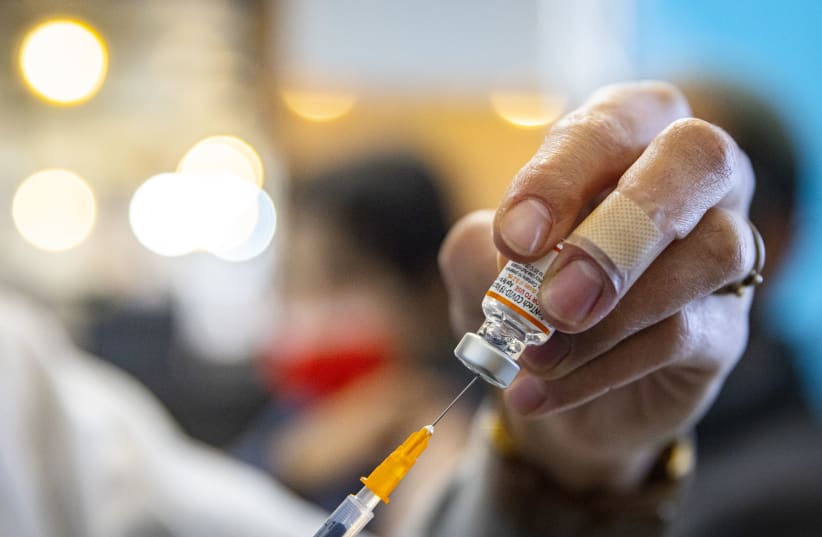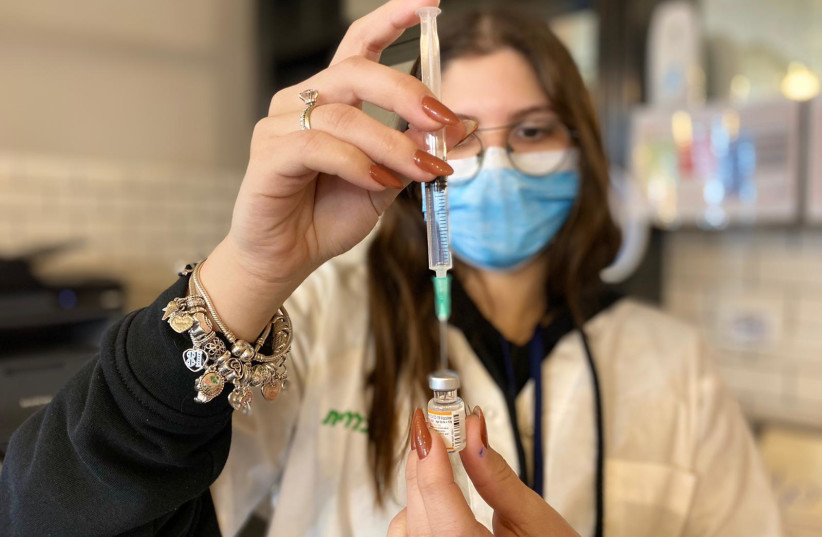The decision by the Pandemic Response Team and the Advisory Committee on Vaccines – both supporting the Health Ministry in the fight against COVID-19 – to recommend administering the fourth shot to people at risk was based on several factors, including data from the field showing a decrease in immunity granted by the booster and the infectiousness of Omicron, according to Prof. Ron Dagan, a member of the committee.
He admitted, however, that the decision was based on the experts’ judgment and understanding of the situation more than on full evidence.
“We all hoped it would not happen, but with time the immunity offered by the third dose is waning,” noted Dagan, who is a professor of pediatrics and infectious diseases at Ben-Gurion University of the Negev.
“This, of course, does not mean that it is completely disappearing, but after three or four months the protection is going down at a rate that does not really suggest that it will stop – and I’m talking about the protection against Delta, without even addressing Omicron.”
Israel was the first country in the world to offer a booster to its general population, starting with individuals over 60 in the last days of July and then quickly opening up the opportunity to younger age groups.
Dagan said the data about waning immunity that were discussed by the panel came directly from the field.
“We are talking about the number of booster recipients who are getting infected, and the time that has elapsed since they were inoculated for the third time,” he said.
According to reports by the Health Ministry, the new cases among people jabbed with a third dose have been significantly increasing recently. For example, of the 1,306 people who tested positive for COVID on Monday, 31% – or 405 individuals – had received a booster. A week earlier, it was 21% of 744 cases – or 156 people.
If it wasn’t for the threat represented by Omicron, Dagan said, the situation would have probably not required such a fast decision about the fourth shot, but some characteristics of the new variant compelled them to act.
“The neutralizing capacity of antibodies against Omicron is much lower than against Delta,” he noted. “If after three shots, the level of protection against Delta is around 95%, with Omicron it already decreases to around 75%, and if it goes further down because more time has passed, it can be a problem.
“In addition, Omicron is 10 times more contagious than Delta,” he added. “In other words, if someone is exposed to it, they have 10 times more chance of getting infected, as we can see what is happening in other countries where the progression of cases is very fast. In Israel, we managed to delay its spread by closing our borders, but now the variant is circulating, and soon this measure will not be effective anymore.”
With such a high level of infectiousness, the professor stressed, even if Omicron was confirmed as less virulent than Delta, because of its ability to spread it would still cause a very high number of serious patients and deaths.
When Israel pushed for the third dose, Dagan said, it was clear that it would help, “and it did even more than we expected.”
But in the current situation, things are less clear.
“We do not have experience with Omicron, which behaves in a completely different way than we expected,” the professor noted. “In addition, we do not have studies on the fourth dose at all.
“In this scenario, we had to make a decision based not on evidence but on our understanding and our judgment as a large group of experts from multiple disciplines,” he acknowledged. “This is something that we admit.”
The panel’s recommendation for the fourth dose issued late Tuesday night will need to be officially approved by Health Ministry Director-General Prof. Nachman Ash before the new vaccination drive can start. In the meantime, it was blessed by Prime Minister Naftali Bennett and Health Minister Nitzan Horowitz.
Some experts, however, expressed perplexity about the choice, lamenting the lack of data.
“In my opinion, this was a scientifically and medically unfounded decision, and I would have opposed it if I had to vote on it,” Dr. Dror Mevorach, a senior physician from Hadassah-University Medical Center, wrote on Twitter. “The fact that we were the first to give a third vaccine does not mean that a fourth is needed without a scientific basis. Antibody decline is a natural condition, and most people have immune memory.”
Dagan said they could not afford to wait any longer.
“We would have all liked to have more data, but we could not wait,” he said.
“We had to weigh the possible damage of a fourth dose versus what benefit it could bring based on an educated guess,” he noted. “We believe that the biggest failure could be that the fourth vaccine is not helpful, but the biggest success could be to reduce the risk of infection for a population of 900,000 people plus medical personnel who are highly exposed and, if sick, could deplete the hospitals of staff when it is needed.”
The professor said that, as usual, the transcripts of the meeting will be published and fully accessible so that everyone can look into the merit of the decision themselves.
“I am curious to see based on which data the panel made the recommendation,” said Prof. Cyrille Cohen, head of the immunology lab at Bar-Ilan University. “I know that there is some evidence that immunity is waning, but I am a little puzzled, I think such a move about vaccines should not be taken lightly.”
Cohen also expressed concern about whether the fourth dose is actually going to help. “I would feel more comfortable if there was some indication in this sense.”
Bar-Ilan University epidemiologist Prof. Michael Edelstein also noted that the data are limited, but he expressed support for the decision.
“I consider it an important precautionary action because we do have early data showing that the antibody level declines after the third dose, and we have a rise in Omicron, and we know that it escapes the vaccine to some extent,” he said.
Israel needed to choose between trying to protect the most vulnerable or waiting for more information, and risking it might be too late.
“We know that the vaccine is not going to be dangerous,” he said. “Millions and millions have received this vaccine without any major consequence, and there is no reason to believe it will be different for the fourth dose.”

